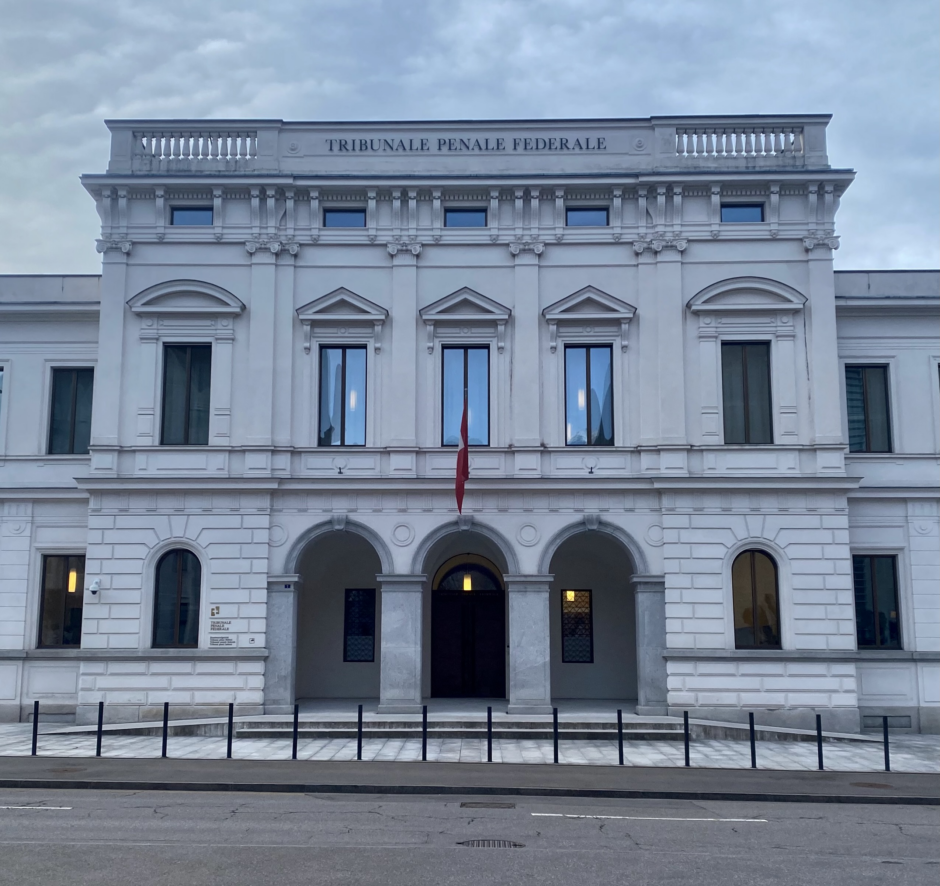
By Antoine Harari with New Narratives
BELLINZONA, Switzerland—The appeal of the Liberian warlord Alieu Kosiah, former commander with the Ulimo rebel group, against his 2021 conviction for war crimes, opened today with a surprise report financed by Kosiah’s friends and family. Redacted by a Liberian lawyer, it consisted of eight pages of fact finding missions and statements by Liberian people involved in the war. There were also photos and two videos, showing the border between Liberia and Guinea where the Ulimo people were forcing civilians to carry goods and cross the Makona river in Solomba. Hoping that it would overturn the conviction of his client, Kosiah’s lawyer Dimitri Gianoli introduced it as new evidence.
However, some elements confirmed the theory of the accusation, especially regarding the forced labor that was imposed on civilians and the looting of generators described as a common practice. It then also shed light on how a certain a was murdered in an airfield in Foya by Ulimo soldiers. As those elements were comforting the version of the plaintiffs and the prosecution, they both welcomed it warmly. It was seemingly another strange move from the defense that doesn’t seem to have changed its argumentation. During the first day, Kosiah kept on saying that he wasn’t present in the places that the plaintiffs and that he had never met them. He seemed to be most of the time dictating the questions to his lawyer that repeated them afterwards.
Between the court decision finding Kosiah guilty of war crimes, and sentenced to twenty years in prison in June 2021, a new charge has been added and new testimonies that came with it. It’s the idea of crime against humanity potentially committed by Kosiah while he was a Ulimo commander against civilians during the civil war. Until recently, the prosecution didn’t want to add this count as this notion was only added in 2011 in the Swiss procedural code. If found guilty, Kosiah could see his sentence increased and he would be a first for the Swiss judicial system.
After some procedural request, the first audition started. It was the client of lawyer Zeina Wakim that took the floor. On request of the judges that wanted to know what toll the war had on her, she began explaining that she had “her brother and father were killed when she was really young” by the Ulimo and that her family presence was still missing today. When he was given the opportunity to speak, Alieu Kosiah tried to ask her if she had met people from the ngo Global Justice and Research Project (GJRP). His lawyer did the same.
After some questions, they moved to the core of her accusation. In order for her not to have to face Kosiah, he was moved into another room and the public was asked to leave. As soon as the judge asked about the traumatic event she allegedly experienced, she burst into tears. After some emotional moments, the plaintiffs lawyers asked their client to leave the room as well. She managed to compose herself in order to reply to the question of the judges. “I was crossing the road because I wanted to find something to eat. A child soldier carrying a rifle on his shoulder called me and told me to follow him”. On request of the judge she confirmed that she had “no other choice to go with him or they would have killed me”. She was then taken to a porch where a lot of soldiers were staying and Kosiah was also present. The judge then asked: “Did Alieu Kosiah ask for your name ?”
“No. He just told me I had to be his wife”. They then moved to another house and she claims that he raped her four times. Asked to recognize him, she was then shown the video of Kosiah in another room. “I recognize his big eyes, the tone of his skin and his face”. She was then asked by Kosiah’s lawyer about famous Ulimo commanders like Pepper and Salt. As she said that she didn’t know their names, he asked how she could have known who Kosiah was at the time. She replied: “As a kid it’s easier to remember the people who hurt you than the others”.
After her very intense testimony, it was up to Kosiah to speak. He started by recognizing the intensity of the testimony of the alleged victim before adding: “Mr President it must be very hard to judge this trial as it regards historical and geographical facts that are very far from you”. Before adding: “If I’ve never met this woman, it’s very hard for me to defend myself”.
The judge quoted the declaration of another plaintiff who will be heard in the coming days.
“A soldier could perfectly ask for any woman to be his wife and she would accept because she would fear the consequences: death. Even AK, who’s sitting behind me, one day took a girl from my community, she had fair skin, she was very young, she was afraid so she followed him. Her boyfriend couldn’t do anything about it because They would be killed.”
Rather than addressing the accusation Kosiah burst out angrily. “Who brought this witness? Alain Werner. And the others? Still him!” He then went on to claim that the whole trial was a conspiracy headed by Werner, lawyer for some of the plaintiffs and head of Civitas Maxima, a Swiss-based justice group, who was “leading a criminal organization”. A depiction of the Swiss lawyer that angered the judge. “I have to remind you that you can be liable for defamation, Mr. Kosiah”.
Shortly before closing the day, the lawyer Zeina Wakim asked her client how she felt about seeing Kosiah today. Without hesitation she replied, “I feel bad because of all the hurt he caused me.”
The trial continues tomorrow.
This story is a collaboration with New Narratives as part of the West Africa Justice Reporting Project.
